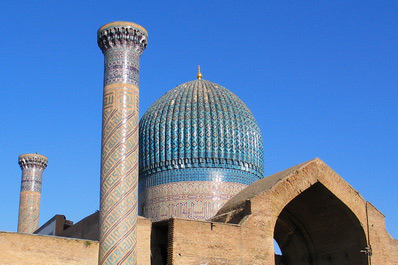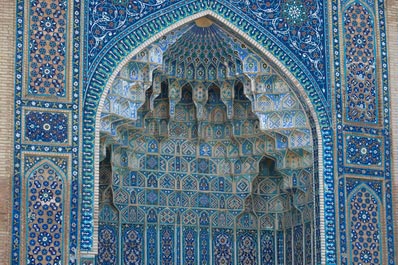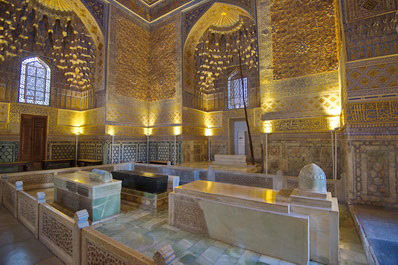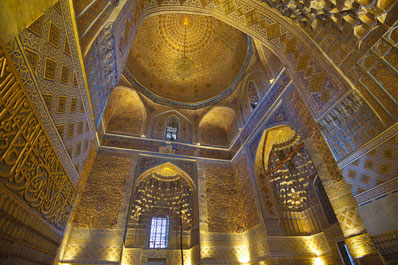Gur-Emir Mausoleum, Samarkand
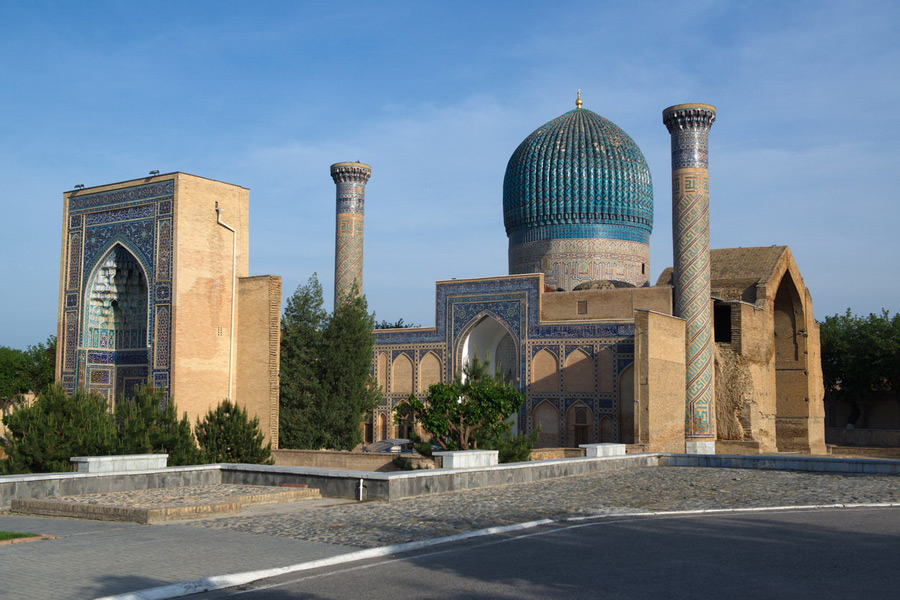
The Gur-Emir Mausoleum in Samarkand is one of the most beautiful and significant architectural masterpieces in Central Asia. It serves as the tomb of Tamerlane (Amir Timur), the great ruler and founder of the Timurid Empire. The mausoleum also holds the remains of several of Tamerlane's descendants, including his sons Shahrukh and Miranshah, his grandsons Muhammad Sultan and Ulugbek, and his spiritual mentor, Mir Said Baraka.
History
Originally, the site of Gur-Emir featured madrasahs and a khanaka. However, following the sudden death of Tamerlane's grandson and heir, Muhammad Sultan, the grief-stricken ruler ordered the addition of a grand mausoleum to the complex.
In 1405, Tamerlane died during a military campaign from pneumonia. Despite his wishes to be buried in his hometown of Kesh (now Shakhrisabz), his body was sent to Samarkand and buried in the mausoleum that was still under construction. After Tamerlane's death, the mausoleum was named Gur-Emir, which means "the grave of the Emir".
Legend
A mysterious legend surrounds the burial place of Amir Timur. According to the legend, anyone who disturbs the tomb of the mighty conqueror of Asia will bring misfortune upon themselves: their lands will be consumed by a bloody war, resulting in countless deaths. In an incredible twist of fate, the “curse of Tamerlane” seemed to manifest. On June 16, 1941, an archaeological expedition began excavating the ancient tomb. When Tamerlane’s crypt was opened, a scent of camphor, incense, and resin filled the air.
Supporters of the theory of a fatal curse were convinced that the released spirit of the great Amir Timur would exact terrible revenge on the intruders. Six days after the tomb was opened, on June 22, Germany invaded the Soviet Union, starting a war. In 1945, a month before the decisive Battle of Stalingrad, Joseph Stalin ordered the return of the remains of Amir Timur and his descendants to their original resting place. After this, the Soviet Union was able to turn the tide of the war and launch a counter-offensive.
Whether or not to believe in the legend of "Tamerlane's curse" is a matter of personal belief rather than an established historical fact. Skeptics argue that there is no concrete evidence linking the tomb's opening to the outbreak of war, dismissing it as a mere coincidence. Believers in mystical forces, however, see the story as proof that ancient curses could pose a real threat.
Architecture
Gur-Emir is a single-domed structure with a crypt, noted for its simplicity of form and monumental architectural design. The main focus is on the large ribbed dome that slightly overhangs the cylindrical drum. The entrance to the mausoleum features a massive, colorful portal dominated by the “honeycomb vault”, a structure made of carved stone elements that resemble a honeycomb. The ribbed surface of arched entrance is richly decorated with mosaics in shades of light blue, dark blue, green, and brown.
Inside, the Gur-Emir is faced with green stone and adorned with carved inscriptions. The interior dome is designed to resemble a star-studded night sky. Soft lighting inside the mausoleum highlights the vaulted ceilings and outlines the decorative elements on the walls, creating a striking effect in the dim light.
The Gur-Emir Mausoleum is also a UNESCO World Heritage Site. When visiting this remarkable place, you can truly appreciate the grandeur and harmony of Eastern architectural art and understand the significance of this cultural heritage, which continues to inspire and amaze with its magnificence.


